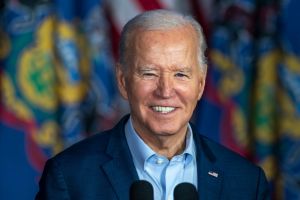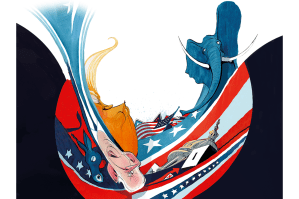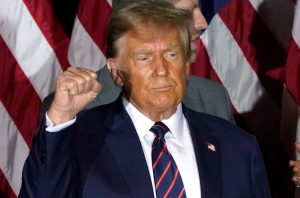Another right-wing populist funded by Peter Thiel is trying to reach the halls of Congress by 2022.
Blake Masters, the COO of Thiel’s investment firm, announced his candidacy for the US Senate in Arizona last week. Masters wants to take action against ‘Big Tech’ and corporations that ‘think they’re too big for America’. Masters’s populist agenda is similar to that of another Senate candidate, Hillbilly Elegy author J.D. Vance, who reportedly received $10 million from Thiel.
In an interview with The Spectator, Masters explained how he intends to reform US manufacturing policy, prioritize onshoring, restrict legal and illegal immigration and engage in a trade war with China, if necessary. While his policy suggestions are ambitious, Masters’s low name recognition in the Grand Canyon State makes the election an uphill battle against more seasoned Arizona politicos such as incumbent Democratic senator Mark Kelly or potentially Republican representative Andy Biggs. The 35-year-old venture capitalist, however, believes his limited political experience is an asset, not a disadvantage.
PN: Should billionaires pay more in taxes?
BM: I’m open to it.
PN: Should Peter Thiel pay more in taxes?
BM: I’m open to it. Look, I know a lot of wealthy people. Obviously, I know Peter really well. Everybody tries to pay the legal minimum, right? Nobody’s trying to overpay their tax bill. What I hear from a lot of rich people is they would be happy to pay more in taxes if the money was used well. These people are used to running businesses. They’re used to being efficient. They don’t like throwing money away. And so when they see a federal government that is so horribly run, there’s tons of waste, fraud and abuse. You know, maybe it doesn’t make sense to pay a boatload of taxes to just have your government go and start dropping bombs randomly in Syria. We’re paying for illegal immigrants to be put up in hotel rooms.
Meanwhile, you go to a public park, and you see military veterans who are homeless in need of mental healthcare, not getting it. So the sense among a lot of rich people that I know is they would actually be happy to pay more in taxes if they were getting something from it. If there was a sense that the government was spending money wisely to help people in America rebuild a middle class and have a functioning society. I think people would be open to paying a little bit more taxes in the top, top, top elite of our economy.
PN: What are the core principles you’re running on, and how do you plan to implement them if elected?
BM: I’ll give you three high-level points. One is just law and order. We certainly have a crisis here at the open border and illegal immigration. It’s hard to see how you can have a real country if you let stuff like this just get out of control. Also, defund the police. It’s just like we’re losing the will to actually arrest people and say bad things are bad. And building a middle-class economy, an economy that actually works for normal people. I don’t want to see this country turn into Brazil. Democrat and Republican economic policies for the last few decades have led us down this bad path. I think we have to take back the culture. I think progressive left-wing activists have taken over almost every single cultural institution, economic institution and political institution. It’s really leading us down a bad path. I want to fight back against that so we can have a prosperous country in the future.
PN: You’re a big fan of Trump’s border wall. What other policies do you support to limit immigration? When it comes to legal immigration, how many legal immigrants should we allow in the country each year, specifically?
BM: Let’s talk illegal immigration first. Yeah, I think we should finish the wall. Walls work. Democrats want to shriek about how it doesn’t work. It’s pointless. ‘You can just climb over it.’ I think that’s bad faith. They were actually upset about it precisely because it works so well. We also need several thousand more border patrol agents and funding more resources to train them, arm them, equip them so that they can actually do their jobs. The third piece that we need is better technology at the border. When Democrats talk about technology at the border it’s usually in the context of an excuse, not to have a wall and not to have a lot of manpower at the border. But actually you need all three. We should have drones, we should have sensors and we should use whatever technologies work best to augment that wall and augment our human personnel down there. So we get serious about those three things. Illegal immigration will be a thing of the past.
In terms of legal immigration, look, we take more than a million people into this country every year, legally, and it’s very unclear why we do that. I think Congress ought to have a debate and ask, ‘Who do we want to come in? How many people? Where should they come from? What skills should they have?’ I’m not dogmatic about any conclusions. I just think we need to have the debate. And right now, we basically don’t. In Silicon Valley, I have seen how badly these companies have abused the H-1B visa program in particular. We do not need hundreds of thousands of people from India and China to come in every year to take coding jobs.
PN: But you mentioned immigration is one of the core tenets of your campaign. What is the specific number? How many legal immigrants do you want to come into the country every year?
BM: Starting by targeting half of what we’re currently doing would be good. I think we should take a look at chain migration. I think we should take a look at cleaning up the H-1B visa program.
PN: Would you be for suspending the H-1B visa program?
BM: You know, I’m open to that. I’m open to suspending it entirely. I think we can probably get the most talented sort of exceptional, brilliant creative people over here on other categories of visa. I think the H-1B system is totally abused. I think we probably should suspend it until we can kind of figure out what’s going on. Should it continue at all? It’s not clear to me.
PN: If you are elected, how do you plan to reshape the economy for the next 10, 15, 20 years? Where are working-class Americans in that vision?
BM: I think we start by recognizing that we need to make stuff in America again, and for decades, I think we’ve pursued policies, maybe well-intentioned, that have basically offshored our industrial base. The pandemic brought into stark relief this kind of sickening feeling like we can’t make so much of what we need right here in this country. We could not make the masks that we needed or that we thought we needed. Last year, we had to import masks from China, where we also imported the virus; it makes no sense. I’m particularly worried about semiconductors. We invented computer chips in the Fifties and Sixties in California and then basically offshored that entire productive capacity to Southeast Asia.
Now, Taiwan, I think, makes half the world’s computer chips. If China takes Taiwan, that would be really bad in many ways, but that’s a national security threat. We can’t even produce the computer chips we need to run the modern economy. So I think focusing on stopping offshore, onshoring to the extent we can, and training our people for the jobs of the 21st century. We’ve got to get serious about this stuff. And for the longest time, it was, ‘Oh, don’t worry, your manufacturing job is going away, but it’s OK because you can move up the value stack as Americans. You can learn to code.’ And it’s like, no, actually, sorry, you can’t really learn to code because we’re going to import 200,000 people a year from India to take that coding job for less money.
PN: You argue we need to restrict free trade. But at the same time, you’ve mentioned you want to help restore the American working class. Due to our current trade policies, consumer prices have steadily declined over the last four decades, especially food prices. How does raising the average cost of food benefit the working class?
BM: Look, it’s all about trade-offs and having wise people evaluate what’s happening and making the right decisions. It’s certainly possible to overcorrect. You could shut down all international trade, and that would be kind of crazy. I think that would be over-correcting, but the point is we’ve gone way too far in the direction of unmitigated free trade. That is what the establishment has been pursuing for 30 years or more. I think it hasn’t worked. And so all I’m suggesting is let’s course-correct, even a little bit. Let’s first point out that so-called free trade with China isn’t actually free trade. If you think you have free trade with China, you’re just getting snowed by China because they’ve got their thumb on the scale. Their state is supporting their domestic industries. They’re dumping steel. When that happens, we don’t just have to sit there and take it and call it free trade. We can actually get serious and manage this stuff.
PN: Well, what can we do?
BM: We can push back with a tariff, which of course, pissed off the Wall Street Journal when President Trump wanted to do it. And neoliberal Democrats were up in arms as well. ‘Trump is irresponsible and starting a trade war.’ No, it actually worked. It works pretty well. We need to start looking, very seriously, at an economic policy that works for the middle of the country.
PN: You say you’re a social conservative. You claim the left has taken over every single cultural institution, economic institution and political institution. How can you take back the culture when you believe the left controls everything? How can one senator from Arizona win the culture war?
BM: Well, I think we have to recognize there’s a huge gulf between what the people who run our institutions think and what most normal everyday Americans think. It can be hard to appreciate this because one of these institutions is the media, right? The prime sort of opinion-making institution. And so what you hear from most of the mainstream media is a narrative that actually most people aren’t really there for. Right now I think there’s a lot of arbitrage opportunities between some of the crazy stuff that the woke generals and our military say, or what the craziest sort of high-profile college professors say, or what Rachel Maddow or what Don Lemon say, but that’s not actually where most Americans are. And so if you get one, two, three, four, five senators in the Senate, if you get a few key congressmen, passing legislation is very important, but it’s not all about that.
We need people who can articulate some of these cultural problems and get in and start showing leadership. I mean, I think you can actually start to see a lot of changes right now. People don’t feel like they are represented. This is why people liked President Trump; people recognized he was an unconventional politician. They liked that he would say things that he thought, that they thought, that they were unable to articulate. If you get a few people in who are serious about leveling with people about the serious problems that we face, that can actually have a lot of cultural power — the power to change the culture.
PN: How are you compensating for your limited political experience on the campaign trail?
BM: I don’t view it as something to compensate for. Experience holding elected office forever is overrated. It’s actually not what voters want. It’s actually not the kind of experience that sets someone up to succeed.
PN: But what about experience winning elections? What infrastructure are you setting up to gain name recognition in Arizona to win?
BM: Well, I guess we’ll have to see how I do. I think we’re pursuing unconventional paths. I’m going out and talking about what I actually believe in, what I think is an agenda that actually resonates with people. I think it’s pretty conservative, but it’s not just a standard consultant-provided Republican talking points. I think you’ll hear a lot of that from my primary opponents here in Arizona. But you know, this campaign in a box, the cookie-cutter approach where every candidate just uses so-called best practices — there’s a reason why everyone looks and feels the same in politics. And I’m trying a very different approach. I’m bullish on my ability to cut through the noise and resonate with voters. I think in a few weeks, in a few months, it will be very clear that I’m a different kind of candidate.
PN: What is the biggest existential threat to the United States in 2021?
BM: I’d have a hard time choosing between two. One is China. China is the biggest geopolitical rival. I think we’ve been asleep at the wheel on China for decades. I think they take a long-term view. They’re deadly serious, a fundamentally incompatible civilization, and we’ve let them have the keys, so that’s going to be a real issue for us. Two, is losing our culture. If we get to a place where something like a sizable fraction of Americans, or half of Americans, look at the American flag and see it as a symbol of irredeemable racism and oppression and evil. If people stop believing that we can have a cohesive country, people will disagree. Obviously, people are very different. That’s the whole thing about America, but there has to be a set of things that we all believe there has to be cultural cohesion. And I think we’re very close to careening off the cliff where we no longer have that. So if we lose the will to be a nation, one people, a culture, then there’s no good future for America. And so that’s an existential threat, even if it’s more of a slow boil.
This transcript has been edited for length and clarity.


















